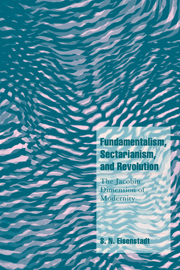Book contents
- Frontmatter
- Contents
- Preface
- 1 Heterodoxies, sectarianism, and utopianism in the constitution of proto-fundamentalist movements
- 2 The Great Revolutions and the transformation of sectarian utopianism in the cultural and political program of modernity
- 3 Fundamentalism as a modern Jacobin anti-modern utopia and heterodoxy – the totalistic reconstruction of tradition
- 4 Historical setting and variability of fundamentalist movements
- 5 Some considerations on modernity
- Notes
- Select bibliography
- Index
4 - Historical setting and variability of fundamentalist movements
Published online by Cambridge University Press: 30 September 2009
- Frontmatter
- Contents
- Preface
- 1 Heterodoxies, sectarianism, and utopianism in the constitution of proto-fundamentalist movements
- 2 The Great Revolutions and the transformation of sectarian utopianism in the cultural and political program of modernity
- 3 Fundamentalism as a modern Jacobin anti-modern utopia and heterodoxy – the totalistic reconstruction of tradition
- 4 Historical setting and variability of fundamentalist movements
- 5 Some considerations on modernity
- Notes
- Select bibliography
- Index
Summary
The intercivilizational setting of fundamentalist movements – the hegemony of the West and the premises of the Western program of modernity
The modern fundamentalist movements developed in specific historical conditions, have been borne by distinct types of leaders and elite groups and supported by distinct social groups. Some of the conditions under which they developed – especially those relating to intercivilizational confrontations – were indeed in a very general way rather similar to those we have identified with respect to the development of proto-fundamentalist movements. The social activists and ideologues that led to development of the modern fundamentalist movements – as was the case for both the various communal-religious and the prior proto-fundamentalist movements – perceived the increasing diversity of ways and styles of life taking place in their countries or civilizations as undermining the existing “traditional” ways and as threatening to their self conceptions. These situations and changing conditions were perceived and interpreted by relatively large, vocal sectors of their societies, and especially by strategically placed elites and influentials as onslaughts on, and threats to their civilizations – perspectives and interpretations to which large sectors of their respective societies were responsive. These conditions, combined with the weakening of existing – in this case modernizing – secular regimes due to internal pressures and struggles, external pressure, and usually through a combination of both, provided the background for the development of the modern fundamentalist movements.
The distinctive characteristic of the broad historical contexts in which these fundamentalist and the various communal-religious movements developed was of course that of the expansion of modernity, above all through colonial and imperialist processes of the West and its encounter and confrontations with many non-Western European religious traditions or civilizations.
- Type
- Chapter
- Information
- Fundamentalism, Sectarianism, and RevolutionThe Jacobin Dimension of Modernity, pp. 119 - 195Publisher: Cambridge University PressPrint publication year: 2000



